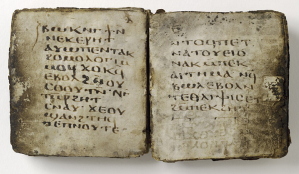
Believed to date back to the sixth century, an ancient book that has been housed in Harvard University's Sackler Museum for more than 30 years was recently discovered to contain unknown gospels.
Titled the 'Gospels of the Lots of Mary' - a reference to the earthly mother of Jesus Christ - the book was deciphered by Anne Marie Luijendijk, professor of religion at Princeton University.
Written in Coptic, an Egyptian language, the opening of the text reads:
"The Gospel of the lots of Mary, the mother of the Lord Jesus Christ, she to whom Gabriel the Archangel brought the good news. He who will go forward with his whole heart will obtain what he seeks. Only do not be of two minds."
Though fragile and worn from use, ancient thumbprints are still visible in the margin.
"Given the book's small size, the handwriting is surprisingly legible and quite elegant," Luijendijk told Live Science.
And in its 160 pages are 37 short oracles designed to provide answers to persons seeking direction - and not necessarily direction from God.
"When I began deciphering the manuscript and encountered the word 'gospel' in the opening line, I expected to read a narrative about the life and death of Jesus as the canonical gospels present, or a collection of sayings similar to the Gospel of Thomas (a non-canonical text)," Luijendijk wrote in her 2014 released book 'Forbidden Oracles? The Gospel of the Lots of Mary.'
But Luijendijk found that Jesus' name is rarely mentioned in the oracles, and though labeled gospels, the ancient writing strays far from the gospel that has been embraced by Christians for centuries.
The writings are oracles read more like answers from a Magic 8 Ball, and experts say that's similar to how they would have been used.
Luijendijk also believes that the book would have been used for predictions.
"A person seeking an answer to a question could have sought out the owner of this book, asked a question, and gone through a process that would randomly select one of the 37 oracles to help find a solution to the person's problem," she said. "The owner of the book could have acted as a diviner, helping to interpret the written oracles."
Measuring less than three inches in height and width, it is believed to have been strategically small which would have made it easy for its owner to carry on travels or to conceal quickly if needed.
And it's the size of the book that provides insight into its acceptance by religious leaders.
While the book does pull from wisdom found in the Bible - specifically the books of Psalm, Job, Proverbs, Matthew and James - it does not rely upon traditional Christian teachings.
"But if you are patient a little, the matter will prosper through the God of Abraham, Isaac, and Jacob," one sentence reads.
Throughout the book there is no mention of heaven, miracles, or eternal life, Luijendijk said.
And the choice of the word lot in the title may stem from books used during that time frame to provide people with predictions.
"The fact that this book is called that way is very significant," Luijendijk told Live Science. "To me, it also indicated that it had something to do with how people would consult it and also about being as good news."
Donated to Harvard in 1984 by Beatrice Kelekian - and donated in memory of her husband, Charles Dikran Kelekian - the ancient manuscript was passed down from Charles' father, Dikran Garabed Kelekian. The elder Kelekian was an art dealer in New York during the turn of the century and known as one of the most influential collectors of Coptic items.






